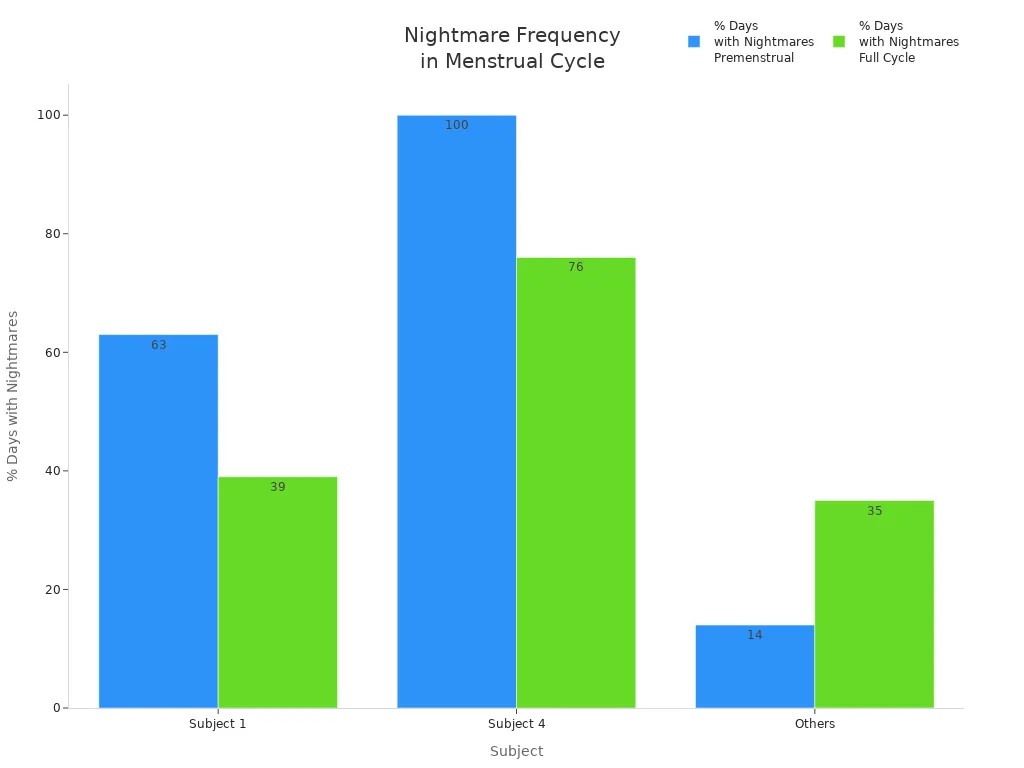
Hormonal changes during your period can lead to weird dreams on period. Many people experience these unusual dreams or nightmares just before their period begins. Research shows that individuals with PMS tend to have more nightmares and intense dreams during this time, as illustrated in the table below. These hormonal shifts make weird dreams on period a common and normal experience, so there’s usually no cause for concern.
Subject | PMS Status | % Days with Nightmares (Premenstrual/Full Cycle) | Average Dream Intensity (Premenstrual/Full Cycle) |
|---|---|---|---|
1 | PMS | 63% / 39% | 4.8 / 5.1 |
4 | PMS | 100% / 76% | 6.8 / 5.7 |
Others | N/A | Varied (14% to 80% premenstrual) | Varied (4.7 to 9 premenstrual) |

Key Takeaways
Changes in hormones during your period, like estrogen and progesterone, can change your sleep. These changes can make your dreams feel more real or strange.
Many people have more nightmares or strong dreams before and during their period. This is normal and happens because of hormone changes.
Bad sleep and changes in REM sleep during your period can make dreams feel stronger. It can also make dreams harder to remember.
Good sleep habits help. Try to go to bed at the same time every night. Stay away from screens before bed. Try to lower your stress. These things can help you sleep better and have fewer vivid dreams.
You can track your sleep and period with a journal or smart device. This helps you see dream patterns. If nightmares make your day hard, you should talk to a doctor.
Hormonal Fluctuations

Estrogen and Progesterone
The menstrual cycle brings many changes in hormones. Estrogen and progesterone are the main hormones involved. Their levels go up and down in a set pattern each month.
Estrogen starts to rise in the follicular phase as the body gets ready for ovulation.
Estrogen reaches its highest point before ovulation, but progesterone stays low.
After ovulation, progesterone goes up and estrogen drops from its highest point.
In the luteal phase, progesterone is at its highest, and estrogen is at a medium level.
If there is no pregnancy, both hormones drop, and a new cycle begins.
These hormone changes do more than just control periods. Estrogen helps set the body’s clock and affects parts of the brain that control sleep and dreams. Progesterone helps people feel sleepy and fall asleep faster. When progesterone is high, sleep is usually better. Changes in these hormones can affect how the brain handles dreams and feelings.
Note: Dreams often feel nicer in the luteal phase when progesterone is high. Progesterone can also help with memory and how dreams are remembered.
Luteal Phase Changes
The luteal phase is after ovulation and before the next period. Hormone changes are stronger during this time. Progesterone gets very high, and estrogen stays steady but lower than before. These changes affect the nervous system and can change sleep.
Higher progesterone makes body temperature go up, which can make it harder to fall asleep.
REM sleep, which is when vivid dreams happen, often goes down in the luteal phase. Slow wave sleep stays about the same.
Many people say their sleep is not as good and they wake up more, even if their sleep pattern does not change much.
The brain’s main clock, called the suprachiasmatic nucleus, has places for estrogen and progesterone to attach. This means these hormones can change sleep and dreams directly.
Hormone changes during the menstrual cycle, especially in the luteal phase, help explain why dreams can feel stronger or stranger. These effects show how hormones, sleep, and dreams are all linked during each cycle.
Hormonal Impact on Sleep
Sleep Quality
Hormones change a lot during the menstrual cycle. These changes can affect how well you sleep. Progesterone goes up before your period. It helps the body get ready for pregnancy. If you do not get pregnant, progesterone drops quickly. This fast drop can make it hard to sleep. Many people have trouble falling asleep or staying asleep before their period. Estrogen also helps control the body’s clock. When estrogen changes, the brain’s sleep centers get more sensitive. This can change how you sleep.
People with hormonal problems, like polycystic ovary syndrome (PCOS), may have even more sleep issues. They might have a higher chance of sleep apnea and poor sleep. After your period, progesterone rises again. This usually helps you sleep better. Progesterone can make you feel sleepy. Estrogen and progesterone both show how hormones and sleep are closely linked.
Sleep Parameter | Change in Luteal Phase vs Follicular Phase |
|---|---|
Total Sleep Time (TST) | No change in young women; decreased in late-reproductive women premenstrually |
Sleep Onset Latency (SOL) | No change |
Sleep Efficiency (SE) | No change in young women; decreased in late-reproductive women premenstrually |
Wakefulness After Sleep Onset (WASO) | Mostly no change in young women; increased awakenings in late-reproductive women |
REM Sleep | Decreased duration of REM episodes; earlier REM onset; negatively correlated with progesterone and estradiol levels in luteal phase |
Note: Studies show sleep can get worse before a period. This is more common for older women or those with PMS.
REM and Dream Recall
REM sleep is when most dreams happen. Hormones can change how much REM sleep you get. When progesterone and estrogen change, REM sleep often goes down. This happens a lot in the luteal phase. Less REM sleep can make sleep feel broken and dreams seem weird.
Cortisol is another hormone. It goes up late at night and during REM sleep. High cortisol can make it harder for your brain to save memories. This can make dreams feel odd or hard to remember. During REM sleep, memory centers in the brain do not work together as well. This makes dreams seem strange or mixed up. People who have vivid dreams during their period often have more balanced REM sleep and hormones. People who do not have vivid dreams may have more sleep problems, less REM sleep, and trouble remembering dreams.
Aspect | People Not Experiencing Vivid Dreams During Menstruation | |
|---|---|---|
Hormonal Influence | May have relatively balanced REM sleep and hormonal fluctuations allowing vivid dreams | Experience drops in estrogen and progesterone that reduce REM sleep and disturb sleep cycles |
REM Sleep | Likely maintain more REM sleep, the phase when vivid dreams occur | Reduced REM sleep, especially in the second half of the menstrual cycle |
Sleep Quality | Possibly better regulated neurotransmitter activity (e.g., acetylcholine, GABA) supporting dreaming | Disturbed sleep with lower GABA receptor activity and reduced allopregnanolone, leading to anxiety and poor sleep |
Tip: Try keeping a sleep journal. It can help you see how your dreams and sleep change during your cycle.
Weird Dreams on Period

Why Vivid Dreams Happen
A lot of people have weird dreams on period. This happens most often right before or during menstruation. These dreams can seem much more real than normal. Scientists think hormones are a big reason for this. Estrogen and progesterone change quickly at this time. These changes affect the brain’s sleep centers. This can mess up normal sleep.
People often have certain types of vivid dreams during menstruation. Some common dream themes are:
Mud or dirty water
Bathrooms or plumbing problems
Things breaking down or falling apart
These dreams may show the body’s way of shedding the uterine lining. The brain sometimes uses symbols to show what is happening in the body. Many people get these dreams for a few nights before their period starts. The dreams can feel odd but are not always bad.
Sleep problems also get worse during menstruation. People wake up more during REM sleep. Most vivid dreams happen in REM sleep. Waking up more means people remember their dreams better. Experts like Dr. Christiane Northrup and Dr. Irshaad Ebrahim say this is linked to hormone changes. Progesterone changes how much REM sleep you get. It also changes how good that sleep is. This makes dreams feel more real and sometimes stranger.
Note: Writing in a dream journal can help you see dream patterns. It can also help you notice changes during each cycle.
Emotional Intensity
Weird dreams on period often come with strong feelings. Hormone changes do not just change sleep. They also change mood. Estrogen and progesterone can cause trouble sleeping and less REM sleep. These sleep problems can make people feel more anxious or sad. When people feel stressed before their period, they may have more nightmares or strong dreams.
Some people have period nightmares. These can feel very real and scary. Nightmares often happen when stress and hormone changes mix. The emotional effects of vivid dreams include:
More anxiety or worry
Feeling sad or down
Feeling sleepy during the day
Feeling less happy overall
It is important to manage these feelings. Stress relief like meditation, deep breathing, or yoga can help. Going to bed at the same time each night helps too. Turning off screens before bed may lower the chance of nightmares. A cool bedroom can help with hot flashes and restlessness. This makes sleep better. Regular exercise, but not late at night, helps sleep and lowers stress. Drinking less caffeine and alcohol before your period can also help stop vivid dreams and nightmares.
Tracking your period and sleep can help you get ready for weird dreams on period. This can make the dreams feel less scary and help you feel better overall.
Period Nightmares
Causes of Nightmares
Many people have more nightmares during certain times of the month. Sleep experts say nightmares can change as your period cycle changes. These changes are stronger for people with PMS. Hormone changes and mood swings during your cycle are important. Estrogen and progesterone levels go up and down. This can change how your brain handles feelings and stress. It can make dreams feel scarier or more real. People with PMS may have nightmares that feel worse. Scientists do not know all the reasons for these nightmares. But they agree that hormones and mood both matter. Some people also have more bad dreams at this time. This can make sleep feel less restful.
When to Seek Help
Most period nightmares are not dangerous and will go away. They usually stop when hormone levels change. But sometimes, nightmares can mean something more serious. You should look for signs that you need help:
Nightmares that make life hard or cause you to feel tired during the day
Nightmares that come with more anxiety or sadness
Waking up a lot at night and not sleeping well
Bad PMS symptoms with anxiety or sadness
Nightmares that keep happening and make daily life hard
Nightmares that hurt your well-being
Changes in things like REM sleep or heart rate
If nightmares get too hard to handle or mess up your day, talk to a doctor. Keeping track of your sleep and feelings can help. Getting help early can make sleep better and lower the effect of nightmares.
Managing Vivid Dreams
Sleep Hygiene Tips
Good sleep habits can help stop vivid dreams. They also help you sleep better during your period. Experts say small changes can make you more comfortable and help you sleep.
Turn down the lights about an hour before bed. This tells your brain it is time to relax.
Use a fan or white noise to block out loud sounds.
Keep your room cool and use light blankets or sheets. This helps your body stay at a good temperature.
Try different sleep positions to feel better. Curl up or put a pillow under your knees if you have cramps.
Use a heating pad to help with pain. Studies say this works as well as ibuprofen.
Do not drink caffeine or alcohol at night. These can make it hard to fall asleep and mess up REM sleep.
Stay away from screens before bed. Blue light can stop your body from making melatonin.
Try deep breathing or relaxing your muscles before sleep.
These tips help your body and mind get ready for sleep. They also help stop vivid dreams from happening.
Stress and Lifestyle
Stress can make dreams stronger and cause more nightmares. Your body makes cortisol when you are stressed. This hormone can make dreams feel more real and easier to remember. If you feel upset before bed, you might have more nightmares.
Lowering stress can help stop vivid dreams. Write in a journal before bed to let go of worries. Try meditation or deep breathing to relax. Light exercise like yoga during the day can help you sleep better. Keeping a diary of your symptoms can help you see patterns. You can also share this with your doctor.
Experts suggest these lifestyle tips to help you sleep:
Go to bed and wake up at the same time every day.
Set your room to about 65°F (18°C) to stay comfortable.
Do things during the day that make you tired at night.
Use pain medicine for cramps if you need it, but do not use sleeping pills for a long time.
Only take supplements like melatonin or progesterone if your doctor says it is okay.
If you cannot sleep, get out of bed and try again later.
Track your sleep and symptoms to talk about with your doctor if you keep having trouble.
These steps help you feel less stressed and sleep better during your period.
Smart Health Tools
Smart health tools can help you learn about your sleep during your period. The Aura Ring by VERTU is a smart ring that looks nice and feels comfortable. It checks your sleep, heart rate, blood oxygen, blood pressure, and glucose. It uses tiny sensors so you do not feel it on your finger.
The Aura Ring gives you a report on your sleep. It shows how much REM sleep you get and if you wake up at night. You can see how your hormones change your sleep and dreams. The Aura app gives you weekly reports and tips just for you. It helps you see patterns and make better choices. You can also get help from health experts through the app.
The Aura Ring checks your health all the time. It helps you find sleep problems early. This tool lets you take charge of your health. You can make changes to sleep better and have fewer vivid dreams.
Hormone changes during your period can cause strong dreams or nightmares. These dreams are normal for most people. Many notice them but are not bothered by them. If dreams feel upsetting, there are ways to help:
Keep track of your period and how you sleep.
Make a relaxing bedtime routine.
Stay away from screens before bed.
Get some exercise often.
Make sure your room is cool at night.
Eat healthy foods every day.
Write down your dreams in a journal.
Try calming activities like deep breathing. 9. Talk to a doctor if nightmares make life hard.
Most people can sleep better and have nicer dreams by making small changes and getting help.
FAQ
Why do dreams feel more intense during a period?
Hormones like estrogen and progesterone change quickly during a period. These changes affect the brain and sleep. Many people notice dreams feel more real or strange at this time.
Can tracking sleep help reduce weird dreams?
Tracking sleep helps people see patterns in their dreams and sleep quality. Using a sleep journal or a smart ring like the Aura Ring by VERTU can give helpful insights.
Are nightmares during a period normal?
Most people have vivid dreams or nightmares during their period. This is common and usually not a sign of a problem. Hormone changes often cause these dreams.
What can help improve sleep during a period?
Keeping a regular sleep schedule, relaxing before bed, and using a cool, quiet room can help. Light exercise and healthy eating also support better sleep.
When should someone talk to a doctor about period dreams?
If nightmares or vivid dreams cause stress, tiredness, or affect daily life, a person should talk to a doctor. Keeping track of symptoms can help the doctor give better advice.






